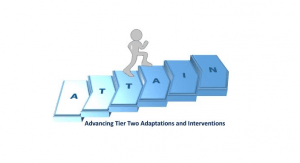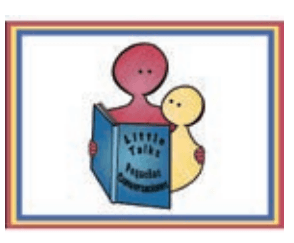ATTAIN (Advancing Tier Two Adaptations and Interventions)
Principal Investigator: Lee Kern, Co-PI: Joseph Wehby (Vanderbilt University)
A three-tiered system of behavior management is designed to meet the needs of students with problem behavior of different  levels of severity. There is emerging research evidence that interventions for students with mild to moderate behavior problems (Tier 2) can be more effective if they are adapted to meet individual student needs. The purpose of ATTAIN is to develop a framework that guides educators in the selection and adaptation of Tier 2 interventions.
levels of severity. There is emerging research evidence that interventions for students with mild to moderate behavior problems (Tier 2) can be more effective if they are adapted to meet individual student needs. The purpose of ATTAIN is to develop a framework that guides educators in the selection and adaptation of Tier 2 interventions.
BEST (Bridges to Educational Success for Teens)
 interpersonal skills support, coaching in academic and organizational skills, and self-regulation strategies may lead to better educational and social outcomes for high school students with ADHD. The purpose of BEST is to examine the efficacy of the multi-component BEST protocol relative to a community care control condition in a sample of 196 high school students with ADHD from Ohio and Pennsylvania. Outcomes will be evaluated across two school years.
interpersonal skills support, coaching in academic and organizational skills, and self-regulation strategies may lead to better educational and social outcomes for high school students with ADHD. The purpose of BEST is to examine the efficacy of the multi-component BEST protocol relative to a community care control condition in a sample of 196 high school students with ADHD from Ohio and Pennsylvania. Outcomes will be evaluated across two school years.Little Talks: Developing the Role of Early Head Start Home Visitors to Provide Evidence-Based Intervention to Families
Principal Investigator: Patricia Manz, Co-PIs: Lori Roggman (Utah State University), & Thomas J. Power (Children’s Hospital of Philadelphia)
 Home visitors work with both children and their parents. The two-generational approach inherent in home visiting programming, presents unique challenges for supporting home visitors’ effective delivery of Little Talks to parents as they assist them to implement the program with their children. The Little Talks intervention uses a modular design that enables home visitors to make adaptations to address infants’ and toddlers’ individual needs for advancing their communication and language skill development. This project employs video and mobile application technology to monitor Little Talks fidelity and apply data to formulate performance feedback in bi-weekly home visitor supervision.
Home visitors work with both children and their parents. The two-generational approach inherent in home visiting programming, presents unique challenges for supporting home visitors’ effective delivery of Little Talks to parents as they assist them to implement the program with their children. The Little Talks intervention uses a modular design that enables home visitors to make adaptations to address infants’ and toddlers’ individual needs for advancing their communication and language skill development. This project employs video and mobile application technology to monitor Little Talks fidelity and apply data to formulate performance feedback in bi-weekly home visitor supervision.
Making Progress with Progress Monitoring: Developing IGDIs (Individual Growth and Development Indicators)
Principal Investigator: Robin Hojnoski
Individual Growth and Development Indicators (IGDIs) for Infants and Toddlers are measures that are designed to monitor progress in early language and literacy skills for children from birth to age 3. The purpose of this project is to design, develop, and test new items for sensitive progress monitoring of individual growth and development in Pre-K children. Fall 2016 to Spring 2017 focuses on the development and testing of new items with 85 Pre-K students. The data will help identify IGDI items of varying difficulty to track early learning progress.
TRAC (Trajectories Related to ADHD in College)
Principal Investigator: Arthur D. Anastopoulos (University of North Carolina), Co-PIs:George J. DuPaul , Lisa L. Weyandt (University of Rhode Island)
Attention-deficit/hyperactivity disorder (ADHD) is a chronic neurodevelopmental disorder that typically impairs educational, psychological, and social functioning. Very few studies have examined the impact of ADHD on college students and no prior investigation has assessed functional impairments associated with ADHD in a longitudinal context across the college years. The purpose of TRAC is to examine the trajectories of educational, psychological and social functioning of first-year college students with and without ADHD on an annual basis across four years.
Read It Again! In Early Childhood Special Education
Pathway 360° College and Career Readiness
Principal Investigator: Lee Kern, Co-PI: Kyle Longacre
There has been a recent emphasis on assuring students in schools throughout the US are college and career ready. Pathway 360° is a comprehensive college and career readiness program for high school students that (a) regularly assesses students’ career preferences; (b) recommends high school courses linked to students’ top three career choices via a computerized system; (c) offers a bi-weekly advisory course with career preparation activities; (d) schedules opportunities for field-based leveled career exploration; and (e) includes a senior presentation related to college and career readiness. This project supports training to replicate the program in schools throughout the United States.
Parents Plus: Language Coach
Principal Investigator: Brook Sawyer, Co-PI: Carol Scheffner Hammer (Columbia University), Co-Is: Annemarie Hindman (Temple University), Ed Feil (University of Oregon)
 Language impairment is the most common disability during the preschool years. The purpose of this project is to develop and pilot test Parents Plus: Language Coach, an intervention aimed at improving the language outcomes of preschool children with language impairment. The program teaches parents to use evidence-based strategies with their children. Parents Plus: Language Coach, is a web-based resource that is coupled with support from a certified SLP coach.
Language impairment is the most common disability during the preschool years. The purpose of this project is to develop and pilot test Parents Plus: Language Coach, an intervention aimed at improving the language outcomes of preschool children with language impairment. The program teaches parents to use evidence-based strategies with their children. Parents Plus: Language Coach, is a web-based resource that is coupled with support from a certified SLP coach.
The Response to Intervention (RTI) Personnel Preparation
Principal Investigators: Robin Hojnoski, Minyi Dennis
Response to Intervention is a tiered approach that provides increased academic support, as needed, based on student responsiveness to instruction. This project aims to achieve an understanding of the cultural, linguistic, and geographic context in the implementation of RTI at the middle/high school level. This project is a collaborative effort between the school psychology program at Lehigh University and school districts within the region who have established working and effective models of RTI, particularly at the middle/high school level. The goal is to develop trainees’ leadership abilities in the facilitation of RTI at the secondary level.

